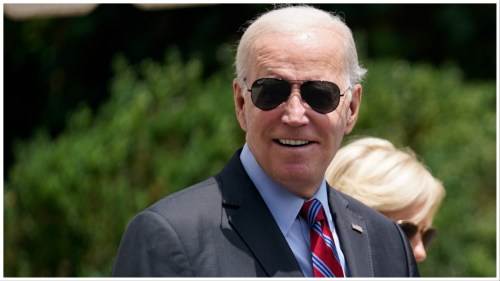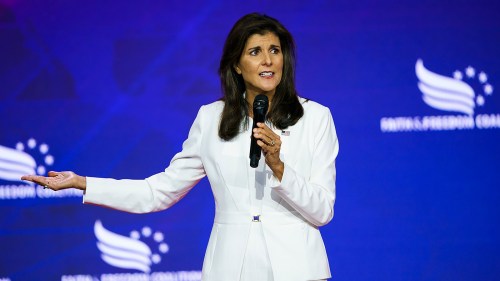Crypto, GOP spending in Arizona Dem primary irks Latinos
A Democratic House primary in Arizona is attracting attention from GOP donors and a super PAC funded by cryptocurrency industry leaders, who are throwing their weight behind one side.
Former state Sen. Raquel Terán (D), Phoenix Councilwoman Yassamin Ansari and physician Duane Wooten are running to replace Rep. Ruben Gallego (D-Ariz.), who is running for Senate.
Protect Progress, a crypto-funded super PAC, has spent more than a million dollars on independent ads supporting Ansari, whose campaign has also received nearly $200,000 from GOP donors.
“It’s disgusting to watch outside millionaires and billionaires try to buy this seat. It’s really abhorrent to see this more and more – California and New York rich people thinking Latino politicians and Latino voters are just pawns in their games of power that they can just move around on a game board or spreadsheet,” said Chuck Rocha, a Democratic strategist.
“The whole community and the [Congressional Hispanic] Caucus has come together for Raquel, and we are gonna stand and fight to keep this seat.”
Terán is backed by Bold PAC, the Congressional Hispanic Caucus (CHC) campaign arm, and has been endorsed by Reps. Raúl Grijalva (D-Ariz.) and Pete Aguilar (D-Calif.), the senior statesman and highest-ranking members of the CHC, respectively.
“This is a blatant effort by an outside group to silence the voices of over half a million Latinos in a majority-Latino district in order to buy a seat in Congress. Raquel Terán has dedicated her career to championing the rights of Latinos across the state,” said Bold PAC Chair Rep. Linda Sánchez (D-Calif.).
“Instead of supporting an exceptionally qualified Latina and the only one in the race, this group has decided to work against the Latino community by pouring in over $1 million against her. This undermines the ability of Latinos to choose their own representative, and it undermines the progress Bold PAC has spent decades fighting for.”
Bold PAC leaders are especially sensitive to interference in a Democratic primary by crypto money, after a Sam Bankman-Fried-backed super PAC injected millions of dollars in a 2022 Oregon primary, forcing open the CHC group’s wallet.
Rep. Andrea Salinas (D-Ore.) won that race, where her opponent received about $13 million in outside support and Bold PAC invested about 10 percent of its disbursements for that cycle supporting a well-positioned state legislator in a primary against Carrick Flynn, an unknown political rookie.
Terán is a major player in the Arizona Democratic Party — she resigned as minority leader of the Arizona Senate in March to focus on her congressional run.
But Ansari, though less experienced, is no Carrick Flynn.
In March, she resigned the Phoenix City Council she’d held since 2021, also to focus on the congressional race.
It’s unclear why Republicans and crypto PACs favor Ansari: Both candidates profess progressive records and have posted similar crypto policies on their websites.
Ansari says that part of her support comes from Iranian Americans who, regardless of party, want to see her elected, while Terán says GOP donors fear her and will seek to influence Ansari.
“I think that these Republican donors … know that I will stand up to GOP donors, like I have done through my career, either from ousting Sheriff [Joe] Arpaio or when I was in the state legislature, when I was the chair of the Arizona Democratic Party,” said Terán.
“My trajectory shows how I stand up to Republicans and Republican extremists. But Ansari will stand with them. I think that they’re making that case.”
Though both candidates call themselves progressive, they come from very different backgrounds.
Terán started out in politics as a grassroots organizer fighting Arizona’s SB1070 immigrant crackdown, grew up in a working class neighborhood in Douglas, Ariz., and had her citizenship challenged after winning her 2018 election.
Ansari, the daughter of Iranian immigrants, attended Stanford and Cambridge, and her first job as a graduate was as an adviser in the executive office of then-United Nations Secretary General Ban Ki-Moon.
In a debate in May, Terán accused Ansari of taking money “from MAGA donors” and said Ansari “is a millionaire landlord herself who has benefited from a loan from her father, and has an investment property, and is charging above the average payment’s rent.”
Ansari dismissed Terán’s “personal attacks,” and went after her legislative record.
“In the last two weeks of the election, it’s disappointing to see Raquel Teran continue to resort to misleading attacks. Teran and her supporters are the only ones in this race that have lodged false, negative attacks against Yassamin, with dark money groups supporting Teran spending upward of $1.5M,” said Pasquale Luz, a spokesman for Ansari.
“Teran accepted money from one of Kari Lake’s closest advisors and aggressively pursued support from the same organization she condemned today. This desperate strategy does nothing to serve the voters. That is why Yassamin is focused on her progressive record of real accomplishments.”
Both candidates would mark significant firsts if elected: Terán would be the first Latina federal legislator from Arizona, and Ansari would be the first Democratic Iranian American in Congress.
But in a district that’s more than 60 percent Latino, Hispanic Democrats are pushing for representatives who share their life experience.
“Outside money coming in to defeat somebody who’s from the district, for the district, by the district, it happens every cycle,” said Kristian Ramos, a Democratic strategist.
“But it’s really sad see it in this case, again, Raquel Terán organized in those communities, knows those communities, would be incredible member of Congress, I think, on behalf of those communities, and it’s shameful that outside groups linked to cryptocurrency and Republicans would spend money to oust her, to prevent her from becoming a member of Congress.”
Latino Democrats’ thin skin about defending so-called “Latino districts” goes far beyond the Arizona and Oregon primaries.
Bold PAC defines its success by two metrics: defending Latino incumbents, and electing new Latinos to Congress.
That attitude stems from the perennial bogeyman of Hispanic underrepresentation in government.
“[Terán] has been a huge champion of Latino families, immigrant families, and [progressives] want to make sure that they keep — we all want to make sure that we keep that seat a Latino, Latina seat, since Ruben was there, and we can’t afford to lose any representation,” said María Cardona, a Democratic strategist.
“We actually, you know, want to continue to gain representation. And so this is a critical, critical, critical seat for us.”
Though Hispanics make up about 20 percent of the U.S. population, they only make up about 10 percent of Congress.
Currently, there are four Hispanic U.S. senators, though Sen. Bob Menéndez (D-N.J.) is expected to resign after his corruption conviction.
Gallego would keep the Senate representation number at four out of 100 if he wins in November.
Representation aside, Hispanic Democrats are making the case that it’s bad form to be associated with GOP money and groups like Protect Progress, whose sister organizations support Republican candidates.
“We in the Democratic Party are open to primaries. I think that’s due to the fact that we can discuss issues. Having healthy competition is, is something that we embrace. I embrace it. I know it. But I also – what I don’t embrace is Republicans meddling in a Democratic primary, Republicans trying to buy a seat, Republicans trying to silence the voices of Latino voters,” said Terán.
Copyright 2023 Nexstar Media Inc. All rights reserved. This material may not be published, broadcast, rewritten, or redistributed. Regular the hill posts












